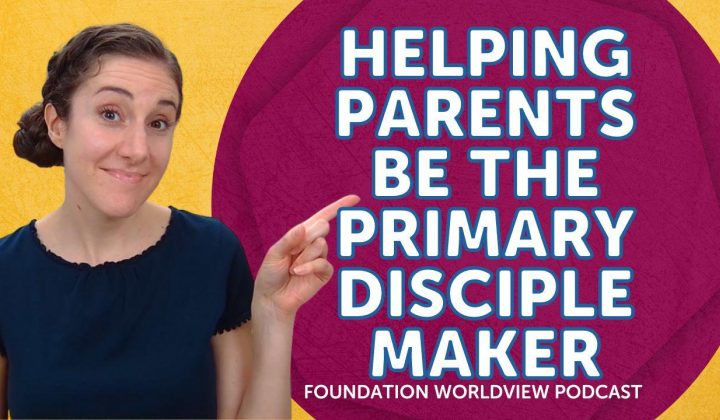Learn more about the journey that led to us equipping kids to carefully evaluate every idea they encounter.
Meet members of our team who have contributed to curriculum development.
Hear from real users of the Foundation Curriculum.
Learn what we believe about God, Jesus, Scripture, and more.
Making Family Worship Accessible for All Ages
In this episode, we dive into how to make family worship time accessible and edifying for children across a wide age range. Elizabeth Urbanowicz shares practical tips for keeping younger children engaged while challenging older kids, ensuring that family worship is a meaningful experience for everyone. Tune in for insights on fostering a worship routine that nurtures your family's faith together.
Transcript
Note: The following is an auto-transcript of the podcast recording.
Hello friends. Today's question says, "Do you have any suggestions for making family worship time accessible and edifying for everyone? Where the children cover a wide age range?" I love this question because I think there are so many great things about it. One, the questioner is having a time of family worship. Two, the questioner is seeking to have everyone in the family involved in this time of family worship. And three, the questioner is wanting to make this time of family worship meaningful. So, so many great things about this question. So if you are listening and you do not currently incorporate a time of family worship into your daily or weekly routine as a family, highly recommend that you do this. And in this podcast we're going to talk about some practical tips for how to do this in your family, and specifically if you have children that span a wide age range.
Well, for those of you who are not familiar with me, my name is Elizabeth Urbanowicz and I am the host of the Foundation Worldview podcast where we seek to answer your questions so that you can equip the children that God has placed in your care to carefully evaluate every idea they encounter and understand the truth of the biblical worldview.
Now, as we think through this question, my heart really goes out to this listener because I understand that it can be challenging to work with children of different ages, and I think the temptation a lot of times when we have children that cover a wide age range, whether it's in our homes or in our churches or in a school setting, is we tend to want to dumb things down to the lowest possible level. Where I'm going to say I think we need to do just the opposite rather than dumbing things down for the lowest age that we have, what we need to do is we need to give those younger children something to strive for.
I remember that when I was in seventh grade, it was my first year taking a foreign language. I started taking Spanish in seventh grade. And on the first day of class, I remember my Spanish teacher saying, "After today, I am only going to be speaking to you in Spanish," which I thought was just insane. I knew maybe how to count one through 10 in Spanish, but I knew no other Spanish words. And my Spanish teacher answered that concern right after, she said she would only be speaking to us in Spanish, and she held up her hand right about at shoulder length, and she said, if I set my expectation for you here you are probably only going to come to about here. And she put her hand down near her waist. Then she said, but if I set my expectation for you here, and she put her hand right above her head, she said, you are probably going to reach about here. And she put her hand again next to her shoulder. And so she said, that's why I am only going to be speaking to you in Spanish after today because I want you to start to have to hear Spanish and start to think through it, and I'm going to set the expectations high.
Now, I did not become a great Spanish speaker when I was in seventh grade. However, I know that I learned so much more in that class because that teacher had such high expectations. Now, her expectations were high, but they were not realistic. If she said, I will expect that starting from tomorrow you will only be speaking in Spanish in every class, that would obviously be unrealistic because there's no way we could have done a seventh grade math class or history class only in Spanish when we knew no Spanish. But she appropriately set the expectations high, and I think that's what we need to do in our times of family worship as we are studying Scripture together, that we need to set the expectations high.
So what this might look like is if you have children, I'm just going to throw out some ages. If you have a 2-year-old, a 4-year-old, a 7-year-old, a 10-year-old, and a 13-year-old, you might be tempted because you have so many children in that younger age range to just take out the storybook Bible and read that for everyone. Even though you know that your older kids are not really going to glean very much from it. Where what I would say is even your 2-year-old is not too young to start reading from the Bible. Now, can your 2-year-old actually read the words? No. That would be a completely inaccurate expectation to expect your 2-year-old to be able to read the words, but to expect your 2-year-old to be able to listen when Scripture is read, that is not an inappropriate expectation. So what I would say is you want to set the expectations high. So set the expectation that everybody's going to be in the room together and you're going to be studying Scripture together.
I have seen this in my own life with friends who have children. I specifically, when I think about family worship times, I specifically think about my pastor from when I lived just outside of Chicago. That when I lived there, he and his wife had four young children. They were all back when I lived there, they were all ages six and younger. And every night they would have their time of family worship where they would come together and they would read Scripture and they would sing a song and they would pray together, and they were reading straight from Scripture, even when kids, when the younger ones were infants and when the older ones, when they were two or three years old, and I was always impressed by how much their kids actually gleaned from Scripture because they were so in the habit of listening to it being read every single night that I know that I was there many times when they had their family worship time. And then there was several evenings when I would go over and I would babysit so that they could, my pastor and his wife could go out on a date and they would ask me then to run that Bible reading and prayer and song time. And I was always impressed by the questions that the kids asked and how much, even at the age of three and four, they were able to pick up on out of Scripture.
So then let's think through, okay, what does it actually look like to have appropriate high expectations? Okay, so expectations that are high but are also develop mentally appropriate. So here are just some general guidelines that I think are helpful no matter what ages your kids are, aim for time limits that are not going to be too long of a stretch for them. If you have multiple children under the age of five, aim for family worship time. That's not going to be any longer than 15 or 20 minutes. Expecting to have a half hour of family worship time when you have multiple children under the age of five is just probably not realistic. I mean, I don't know, maybe you have very exceptional three, four, and five year olds who can sit down and listen for a long time. But for most children that age, anytime above 15 or 20 minutes is going to be a little bit too much.
Then also have developmentally appropriate expectations for little one's bodies. You can allow them to stand or you can allow them to sit on the floor. You can allow them to change positions throughout. They don't have to be seated there quietly the whole time. Now, you don't want them running around. You don't want them playing with toys. You don't want them doing things that are distracting. But if they're standing up and their body is sway a little bit, that's fine. If they're sitting on the floor and then they decide to stand up, that's fine. If they sit on your lap and then they want to sit on the floor, that's fine, so long as it's not distracting them from listening or distracting others.
And then you're going to want to make sure that you're actually diving down into Scripture so that you and all of your children are getting into God's word. Now, if you feel intimidated by the thought of leading your children in Scripture or even where to start, highly recommend that you check out our Studying the Bible Curriculum at Foundation Worldview. That is for children 8 on up. So if you have little ones, your little ones probably aren't going to glean too much from that curriculum, but that's a curriculum that you can purchase and you can even just go through on your own to give you some basic sound skills in Bible interpretation and study. And then as you have children who are eight and up, you can take them through that so that they're prepared in that family worship time and on their own to go through Scripture.
So what should family worship time look like? Whether you've never done family worship time before or whether you have and you're just thinking through, okay, how do I make this accessible to all of my children? So what I'm going to present is not an end all be all formula. It's not something that you have to do. It's just a suggestion. If you are looking for just a method that's going to be developmentally appropriate for your children and going to include elements of seeking God through his word and through prayer. So what I would recommend is just start out by having one of your children pray. And this could be any of your children. Hopefully all of your children are used to praying before meals, before bedtime. So start off by having someone praying, thanking God for this time and praying that you would all be able to seek him and learn more about who he is. Then it's always a good idea whenever you are in the position of leading something or teaching something to just do a brief review of what you covered last time. Because with the way that God designed the human mind to work is on average we need seven exposures to the same content before it really sticks and becomes a part of our everyday thought processes. So just ask one of your kids and say, okay, who can remember what we read about last time? What was the passage of Scripture that we read and have one or more of your children review that and then you can review, okay, what truths do we learn about God in that passage of Scripture? Then after that, hopefully you've chosen a passage of Scripture ahead of time, and then have someone in your family read through that Scripture. And so this, if you have children who can read, that's a great opportunity to get them involved and then discuss what truths are revealed about God. That's a really great first question to go through with our kids so that we're training them to understand that Scripture is primarily about God. It is God's self revelation. It's how God has created the world, how God has created us. It's about God's plan for redemption. It's about God revealing himself to us. So ask, Hey, what truths about God are revealed in this passage? Now, if you've never asked that question before, it might be hard for your kids to find something in the passage that you read. So that's where you can model showing how I see this truth about God revealed in these verses right here. And then after you've discussed what truths about God are revealed, discuss how those truths apply to your every day lives. If you've just learned that God is sovereign, that he is in control of all, and that he is guiding the events that are happening in the world and in our lives, talk about, okay, how does this apply to our lives? Well, if we know that God is sovereign, if we know that he is in control, well, this means that when things that are unexpected or scary happen to us, that we don't need to be anxious, that we can trust God. Or you can talk about if one of your children has something coming up that they're feeling anxious about. If you're anxious about, I don't know, going on this family trip or going to soccer camp tomorrow, what can you remind yourself of? Yeah, you can remind yourself of this truth that God is sovereign, that God is in control, and then you can close by sharing prayer requests for your family and then also for your neighbors and your church family, just so your kids get in the habit of bringing their requests before God and thinking about what requests they can bring for others before God, and then close in a time of prayer together.
Now, as I mentioned, this is just a suggestion. Your family worship time may look different depending on who your kids are or your situation. So it's going to look different for every family, but just remember what I recommended. Keep the timing and the behavioral expectations develop mentally appropriate. Okay? So we're going to want to aim high, but we're going to want to make sure that in that aiming high, that we're keeping the expectations developmentally appropriate. That we're not expecting this to be an exorbitant amount of time, especially if we have little ones that we're not expecting our little ones to sit perfectly still for 15 or 20 minutes, that we allow them some wiggle room, literally some literal wiggle room to get out those wiggles, and then that we are striving to have our children in the presence of God diving into his word.
Well, that's a wrap for this episode. If you have a question that you would like for me to answer on a future Foundation Worldview podcast, you can submit that by going to FoundationWorldview.com/podcast. As we leave our time together, my prayer for you is the same as always, that no matter the situation in which you and the children God has placed in your care, find yourselves that you would trust that God is working all things together for your good. By using all things to conform you more into the image of His Son. I'll see you next time.
Related Posts and insights

Making Corporate Worship Kid-Friendly: Insights for Pastors and Parents
Join us as we discuss how to make your church's corporate worship services more engaging for children. This episode offers practical advice for pastors and parents, highlighting successful strategies that ultimately help create a culture of family worship and discipleship.

Helping Parents be the Primary Disciple Maker
How do we help parents be equipped to disciple the children in their care? In this episode, Elizabeth Urbanowicz, speaks to parents and church ministry leaders about how we can help parents see the need to be the primary disciple makers to their children, and how this can be modeled for other parents.

How To Do Family Devotions
Elizabeth Urbanowicz shares her experience growing up with family devotions and provides ideas on how to start and lead family devotions.





